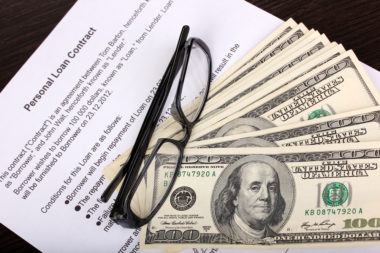If you have a bad credit score of 579 or lower, no credit history, or a less than perfect credit report, you may assume there’s no way to qualify for a personal loan. Lenders look at your credit history and score to determine how great of a risk you’ll be as a borrower. Your credit also determines the loan terms you qualify for.
With a low score or no credit history for a lender to review, they have no way to predict how financially responsible you’ll be as a borrower. You may be denied by several lenders when you apply for a personal loan. Lenders that do accept you as a borrower may offer you unfavorable loan terms with low loan amounts or high-interest rates.
While you may qualify for a personal loan with bad credit, improving your history increases your loan and lender options. There are steps you can take to ensure you qualify for a personal loan with favorable terms and a reputable lender. By implementing these steps, it’s more likely you’ll be eligible for a loan that meets your needs and helps your financial situation.
Table of Contents
1. Gather Your Personal Information
Having a firm grasp on your financial situation helps you determine what type of loan payment you can afford each month. Gather your personal and financial information so you can review it and be prepared for the documents a lender will ask for. You should gather:
- Information on your monthly income, such as paycheck stubs.
- Your monthly bill amounts, including any debt you pay.
- Your employment information.
- Your mortgage or rent information.
- Other information on your household income and expenses.
- Your driver’s license.
- Your Social Security number.
With these items in hand, you’re ready to apply for a loan. These documents will also help you calculate your debt-to-income ratio, which allows you to decide how much you can afford while remaining financially stable.
2. Review Your Credit Report
Your credit report is the key to qualifying for a personal loan since it provides information on your overall credit health and credit score. Before applying for a loan, review your own credit report so you can learn what a lender will see after you do apply.
Identify the areas you feel you can improve on, such as lowering your debt or paying your bills on time. Even if you’re not planning to apply for a loan, reviewing your credit report regularly is helpful to ensure you catch any errors and always know what to work on.
3. Compare Loan Types
Before applying for a personal loan, review the types of loans you may qualify for so you can choose the one that meets your needs. You may be eligible for:
- Unsecured personal loan: An unsecured personal loan is common when you simply need cash to pay for home improvement, vacation, or other purchases. There’s no collateral for the loan, which increases the risk for the lender.
- Secured personal loan: With a secured personal loan, you’re offering collateral to lower the risk for the lender. These loans are common when making big purchases, such as a car or a house.
- Line of credit: A bank may offer you a line of credit up to a certain borrowing limit. This type of loan works like a credit card because as you pay down the loan balance, you can continue borrowing money up to the limit.
- Payday loan: With a payday loan, the lender provides you a short-term loan, usually with a low loan amount and high-interest rate. You pay the loan back when you get paid, plus interest.
When choosing the type of loan that’s right for you, consider how much you need, what you need it for, when you can pay it back, and what you can afford. The more risk a lender takes with a loan, the more unfavorable the terms are likely to be for you as the borrower.
4. Shop Around
Take the time to look at loans from banks, credit unions, and other financial institutions. Even if you have bad credit, don’t settle for unfavorable loan terms because you assume it’s all you can qualify for. It’s important to review your options because you may qualify for better loan terms with a different lender.
5. Research Lenders
Before you agree to work with a lender, do your research by looking into past customer reviews and learning about the lender’s business practices. Some lenders may be involved in predatory lending practices that could cause you to owe more money than you originally agreed to pay.
In addition to predatory lenders, it’s also important to look out for loan offers that are simply too good to be true. In many cases, these aren’t legitimate lenders and may simply be out to scam consumers. It’s important to look out for lenders that:
- Aren’t concerned with your credit score or history.
- Aren’t licensed in your state but advertise in your location anyway.
- Ask you to wire money or pay an individual instead of a business.
- Offer you loan approval and terms by phone without asking for information.
- Don’t disclose all fees upfront.
- Have a confusing or complex loan origination process.
6. Repair Your Credit
Taking the time to increase your credit score is crucial if you’re looking for favorable loan terms. While you may still qualify for a personal loan with a low credit score, repairing your credit ensures you obtain better loan terms that are more affordable. A better credit score and stronger credit history is also important for future financial situations, such as buying a house or qualifying for a credit card.
7. Be Patient
The loan terms you agree to can positively or negatively affect your financial situation and credit history. Therefore, it’s important to be patient when applying for a personal loan. With poor credit or no history, it may take you a while to find a lender that offers you a personal loan. Researching potential lenders and building your credit so you have more loan options ensures you make the best choice for your financial stability.
If you’re in need of a personal loan but have a low credit score, you may still qualify with certain lenders. Before you agree to a loan, review the terms and be sure you’re comfortable with the monthly payment and loan amount. Research the lender and analyze the loan to ensure it’s legitimate.
While you may be eligible for a personal loan without perfect credit, your credit score and history are important to a lender. Working on improving your credit score will also benefit you in the future by proving you’re a trustworthy borrower.
Image Source: https://depositphotos.com/





